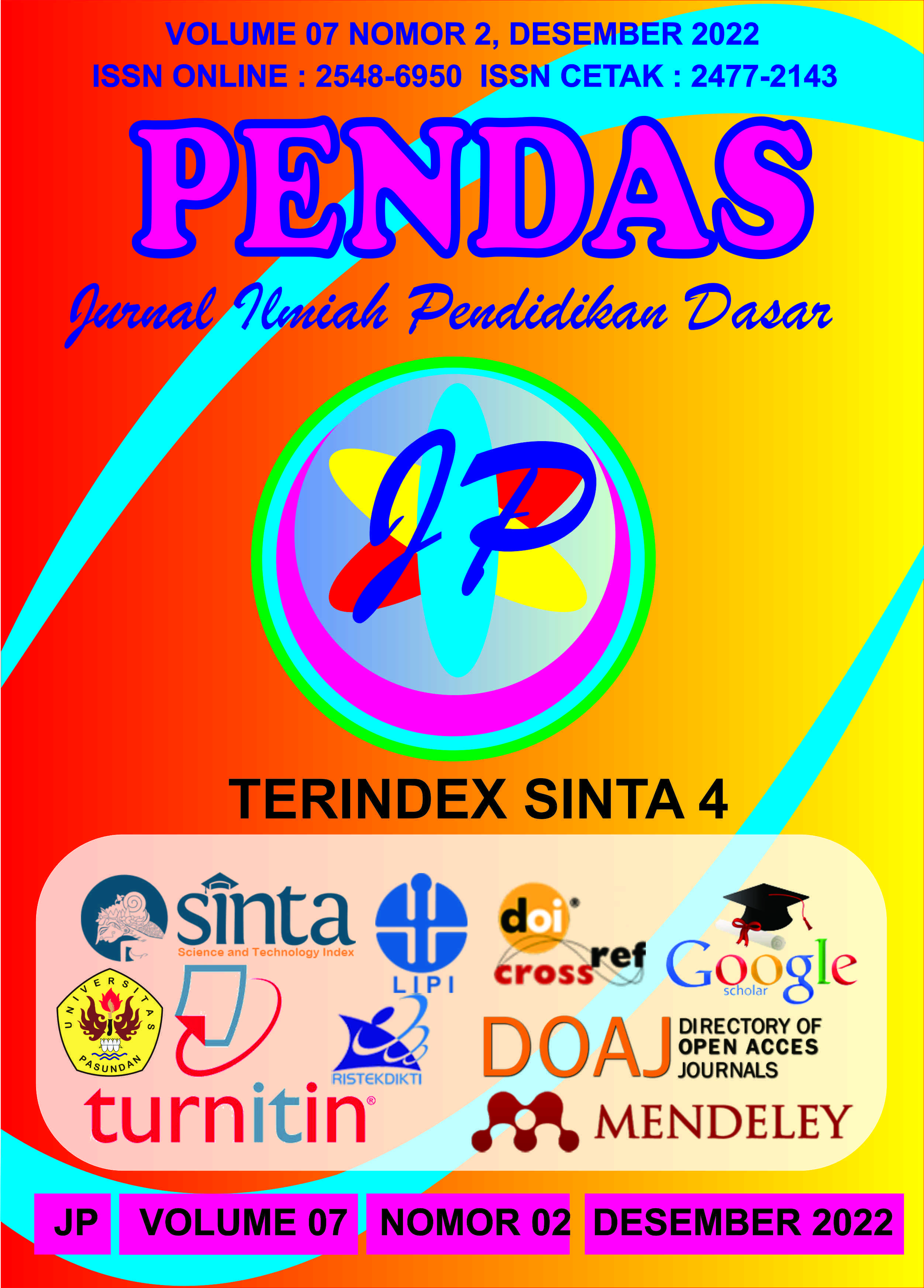PENERAPAN MODEL PEMBELAJARAN PROBLEM BASED LEARNING (PBL) DALAM BLENDED LEARNING UNTUK MENINGKATKAN KEMAMPUAN KOLABORASI, KETERAMPILAN BERPIKIR KRITIS, DAN PENGUASAAN KONSEP MATEMATIKA KELAS IV SEKOLAH DASAR XYZ JAKARTA
DOI:
https://doi.org/10.23969/jp.v7i2.6322Keywords:
model pembelajaran problem based learning (PBL), kemampuan kolaborasi, keterampilan berpikir kritis, penguasaan konsep matematikaAbstract
Keterampilan yang perlu dikembangkan untuk memenuhi kebutuhan abad ke-12 adalah keterampilan berpikir kritis dan kemampuan kolaborasi, serta penguasaan konsep matematika. Namun banyak siswa belum memiliki kedua keterampilan tersebut. Metode pembelajaran yang tidak berfokus pada siswa membuat siswa tidak mampu berpikir kritis dan berkolaborasi dalam memecahkan masalah. Oleh sebab itu, penelitian dilakukan dengan tujuan untuk menganalisis perkembangan kemampuan kolaborasi, keterampilan berpikir kritis, dan penguasaan konsep matematika melalui model pembelajaran Problem Based Learning dalam blended learning. Metode yang digunakan dalam penelitian ini adalah Penelitian Tindakan Kelas (PTK) dengan memberikan 15 pertanyaan pada tes tertulis yang diisi oleh 20 siswa kelas IV SD di sebuah sekolah swasta di Jakarta. Penulis juga memberikan 2 buah rubrik sesuai dengan kompetensi yang dianalisis. Cara pengumpulan data yang diterapkan dalam penelitian ini adalah tes soal berupa pre-test dan pos-test. Hasil yang diharapkan adalah model pembelajaran Problem Based Learning dalam blended learning memberikan peningkatan nilai matematika siswa.
The skills that need to be developed to meet the needs of the 12th century are critical thinking skills and collaboration skills, as well as mastery of mathematical concepts. However, many students do not yet have these two skills. Learning methods that do not focus on students make students unable to think critically and collaborate in solving problems. Therefore, the research was conducted with the aim of analyzing the development of collaboration skills, critical thinking skills, and understanding mathematical concepts through the Problem Based Learning model in blended learning. The method used in this research is Classroom Action Research (CAR) by giving 15 questions on a written test filled out by 20 fourth grade elementary school students in a private school in Jakarta. The author also provides 2 rubrics according to the competencies analyzed. The data collection method applied in this study was a test of questions in the form of pre-test and post-test. The expected result is that the Problem Based Learning model in blended learning provides an increase in students' mathematics scores.
Downloads
References
Aslamiah, A., Abbas, E. W., & Mutiani, M. (2021). 21st-Century Skills and Social Studies Education. The Innovation of Social Studies Journal, 2(2), 82. https://doi.org/10.20527/iis.v2i2.3066
Castañer, X., & Oliveira, N. (2020). Collaboration, Coordination, and Cooperation Among Organizations: Establishing the Distinctive Meanings of These Terms Through a Systematic Literature Review. Journal of Management, 46(6), 965–1001. https://doi.org/10.1177/0149206320901565
Cronje, J. C. (2020). Towards a new definition of blended learning. Electronic Journal of E-Learning, 18(2), 114–135. https://doi.org/10.34190/EJEL.20.18.2.001
Crowl, T. K., Kaminsky, S., & Podell, D. M. (2015). Educational Psychology: Windows on Teaching. New York: Brown and Benchmark Publishers.
Fauzan Alan, U. (n.d.). KEMAMPUAN PEMAHAMAN MATEMATIS SISWA MELALUI MODEL PEMBELAJARAN AUDITORY INTELLECTUALY REPETITION DAN PROBLEM BASED LEARNING (Studi Penelitian di SMP Negeri 1 CisurupanKelas VII).
Ghaemi, F., & Mirsaeed, S. J. G. (2017). The Impact of Inquiry-based Learning approach on Critical Thinking Skill of EFL Students. EFL JOURNAL, 2(2). https://doi.org/10.21462/eflj.v2i2.38
Hallinger, P. (2021). Tracking the Evolution of the Knowledge Base on Problem-based Learning: A Bibliometric Review, 1972-2019. Interdisciplinary Journal of Problem-Based Learning, 15(1). https://doi.org/10.14434/ijpbl.v15i1.28984
Hrastinski, S. (2019). What Do We Mean by Blended Learning? TechTrends, 63(5), 564–569. https://doi.org/10.1007/s11528-019-00375-5
Lau, J. Y. (2011). Critical Thinking - An Introduction To Critical Thinking And Creativity Think More, Think Better. Canada: John Wiley & Sons, Inc. Retrieved September 23, 2020, from https://www.pdfdrive.com/an-introduction-to-critical-thinking-and-creativity-e33464296.html
Linda M. Murawski, E. (2014). Critical Thinking in the Classroom...And Beyond. Journal of Learning in Higher Education, 25-30.
Lukman, M. T. & Tantu, Y. R. P. (2022). Guru Sebagai Fasilitator Dalam Mengasah Kemampuan Berpikir Kristis Siswa Pada Pembelajaran Daring. Pendas : Jurnal Ilmiah Pendidikan Dasar, 7(1), 62-73.
Lutvaidah, U. (2015). Pengaruh Metode Dan Pendekatan Pembelajaran Terhadap Penguasaan Konsep Matematika. Jurnal Ilmiah Pendidikan MIPA, 279-185.
Narmaditya, B. S., Wulandari, D., Rosnita, S., & Sakarji, B. (n.d.). DOES PROBLEM-BASED LEARNING IMPROVE CRITICAL THINKING SKILLS?
Nur, S., Panca Pujiastuti, I., & Rahman, S. R. (2016). Efektivitas Model Problem Based Learning (Pbl) terhadap Hasil Belajar Mahasiswa Prodi Pendidikan Biologi Universitas Sulawesi Barat. In JULI (Vol. 2, Issue 2).
Rahmawati, A., Fadiawati, N., Diawati FKIP Universitas Lampung, C., Soemantri Brojonegoro No, J., & Lampung, B. (2019). Analisis Keterampilan Berkolaborasi Siswa SMA pada Pembelajarn Berbasis Proyek Daur Ulang Minyak Jelantah. In Jurnal Pendidikan dan Pembelajaran Kimia (Vol. 8, Issue 2). https://jurnal.fkip.unila.ac.id/
Redhana, I. W. (2012). Model Pembelajaran Berbasis Masalah Dan Pertanyaan Socratik Untuk Meningkatkan Keterampilan Berpikir Kritis Siswa. Cakrawala Pendidikan, 351-365.
Rochmawati, A., & Ridlo, S. (2020). Analysis of 21st Century Skills of Student on Implementation Project Based Learning and Problem Posing Models in Science Learning. Journal of Primary Education, 9(1). https://doi.org/10.15294/jpe.v9i1.28753
Santosa, D. S. S. & Pohan, D. P. S (2022). Pengaruh Pendidikan Matematika Realistik Berbantu Powerpoint Interaktif Dalam Meningkatkan Motivasi Dan Hasil Belajar Siswa Kelas 1 Selama Pembelajaran Online Di SDK Saint John Bekasi. Pendas : Jurnal Ilmiah Pendidikan Dasar, 7(1), 9-24.
Snyder, L. G., & Snyder, M. J. (2008). Teaching Critical Thinking and Problem Solving Skills. The Delta Pi Epsilon Journal, 1(2), 90-99. Retrieved October 19, 2020, from https://www.semanticscholar.org/paper/Teaching-Critical-Thinking-and-Problem-Solving-Snyder-Snyder/2d56f0919bbd1256bd9e0cb813013b6892e63629
Swanson, D., Hall, D. R., & Carroll, D. B. (2007). Critical Thinking : Critical Thinking Workshop. Retrieved September 23, 2020, from http://skepdic.com/ct/handout.pdf
Tawfik, A. A., Gish-Lieberman, J. J., Gatewood, J., & Arrington, T. L. (2021). How K-12 Teachers Adapt Problem-Based Learning. Interdisciplinary Journal of Problem-Based Learning, 15(1). https://doi.org/10.14434/ijpbl.v15i1.29662
Downloads
Published
Issue
Section
License
Copyright (c) 2022 Pendas : Jurnal Ilmiah Pendidikan Dasar

This work is licensed under a Creative Commons Attribution 4.0 International License.














































